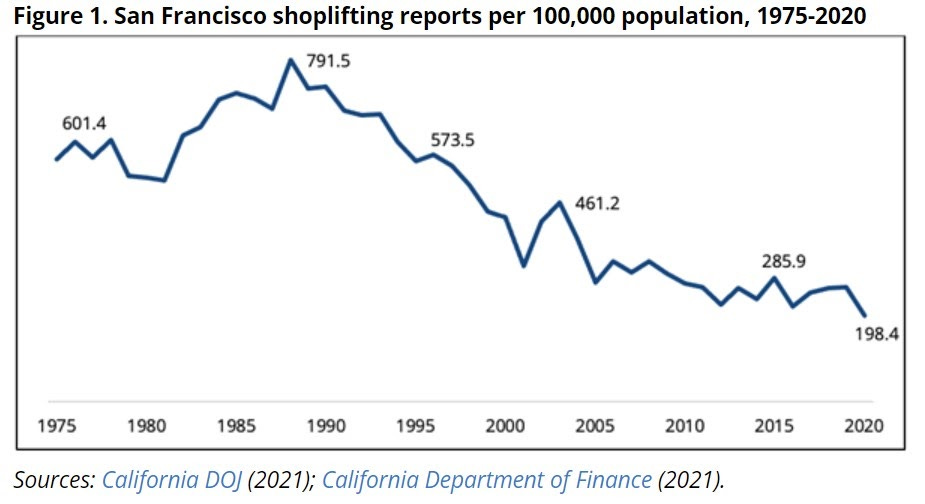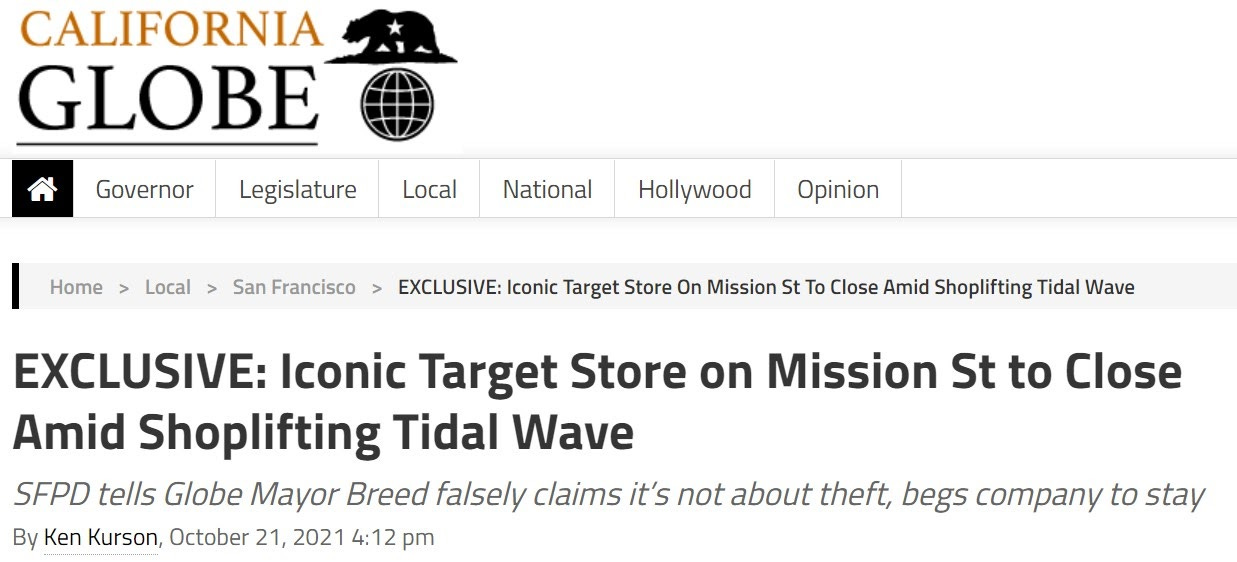The truth about shoplifting in San Francisco
Is there an epidemic of shoplifting by "organized gangs'' in San Francisco? And does it prove that the state's efforts at criminal justice reform have failed?
Walgreens, one of the nation's largest drugstore chains, claims that retail theft in the city is proliferating. "Organized retail crime continues to be a challenge facing retailers across San Francisco, and we are not immune to that," Walgreens said in October, announcing the closure of five stores in the city. The company told the New York Times in May that "thefts at its stores in San Francisco were four times the chain’s national average, and… the scale of thefts had made business untenable."
These claims, however, are not reflected in the citywide crime data. In 2020, shoplifting in San Francisco reached its lowest level since statistics began being collected 45 years ago.
By April 2021, shoplifting incidents increased slightly, but remained well below pre-pandemic levels. The latest data from the San Francisco Police Department, which includes incidents through October, shows that there were 24,890 larceny thefts in 2021, which is a 13% increase from the same period last year. But the overall number of thefts remains well below the level of 2019, when there were 35,512 thefts through October.
That, of course, doesn't mean there weren't a rash of shoplifting incidents at the stores that Walgreens decided to close. But data obtained by the San Francisco Chronicle "does not support the explanation announced by Walgreens." The San FranciscoChronicle found:
One of the stores set to close, on Ocean Avenue, had only seven reported shoplifting incidents this year and a total of 23 since 2018, the data showed. While not all shoplifting incidents are reported to police, the five stores slated to close had fewer than two recorded shoplifting incidents a month on average since 2018.
In 2019, Walgreens "said in a U.S. Security and Exchange Commission filing that it would shutter 200 stores" as "one of several cost-saving measures projected to save $1.5 billion in annual expenses by 2022." The San Francisco Chronicle reported that the disconnect between the data and Walgreens' claims raised the question of whether the company "was using an unsubstantiated narrative of unchecked shoplifting to obscure other possible factors in its decision."
Before Walgreens' narrative fell apart, it helped generate coverage in the New York Times on "San Francisco’s Shoplifting Surge." In that piece, published in May 2021, Thomas Fuller, the New York Times' San Francisco bureau chief recounts his own experience in a Walgreens when he saw a man who "grabbed a handful of beef jerky and walked out." That anecdote, along with Walgreens' claims, was used to buttress the argument that criminal justice reform — including a "2014 ballot measure that reclassified nonviolent thefts as misdemeanors if the stolen goods are worth less than $950" — had failed. Fuller, quoting a local politician, suggested that theft in the city now carried "no consequences" and was therefore happening "over and over."
The New York Times piece did not appear in a vacuum. The false narrative of out-of-control crime in San Francisco, and California as a whole, is being pushed relentlessly by a far-right website run by a former Republican consultant who received a pardon from Trump.
California's leading source of crime disinformation
On October 21, the California Globe published a story about a Target store in downtown San Francisco that was closing “amid shoplifting tidal wave.” The story was an exclusive and featured several unnamed San Francisco Police Department officers who claimed that the Mission Street Target will “be closed by the end of the year despite having solid revenue, because they cannot get the shoplifting under control.”
The article quoted one anonymous officer who claimed that the amount of theft occurring at the store effectively brought the store’s daily profits to “zero.” The story also claimed that officers stationed at the store were unable to deter these crimes, with one officer complaining that shoplifters “get no time in jail to think about what they did.”
But the Target store wasn’t closing.
A Target spokesperson confirmed with the San Francisco Chronicle that the store was “not closing” and “that was incorrectly reported.” Target also reached out to the California Globe the day following the story’s publication. “The information posted to California Globe about our stores is not accurate. We are not closing the Mission St. store,” Target’s Senior Director of Communications Joe Poulos said.
Nevertheless, the California Globe did not change its headline. It remains “EXCLUSIVE: Iconic Target Store on Mission St to Close Amid Shoplifting Tidal Wave.”
This isn’t the first time the California Globe has pushed false narratives around San Francisco’s crime rates. When the site reported on the Walgreen closures, it falsely asserted that “crime in San Francisco has gone up continuously since the mid-2010’s, with the largest spike occurring only within the last few years.” That is not true, according to the crime data that San Francisco submits monthly to the FBI.
Instead of acknowledging that the data does not support claims of sharp increase of shoplifting in San Francisco, the outlet shifted its focus on “unnoticed, unreported theft.” These stories typically pin the blame on San Francisco Mayor London Breed, District Attorney Chesa Boudin, and the 2014 ballot initiative, Proposition 47. “Denial is the refusal to acknowledge the existence of an unpleasant reality. Welcome to San Francisco,” ends one article.
False report in California Globe used to “flip California House seat”
Reporting by the California Globe was also used to influence the 2020 Congressional race in California. Last fall, the publication published an article accusing then-Representative Gil Cisneros (D-CA) of insider trading. According to CalMatters, a nonprofit publication that reports on California politics, the story reported that Cisneros sold “219 stocks after Congressional briefings” at the beginning of the pandemic, calling it “a serious offense.” However, the article failed to contextualize this information by not including the fact that Cisneros also bought other stocks during the same period, and “continued to trade stocks after the stock market crashed.”
In September 2020, the California Globe article was used in a press release by Cisneros’ opponent, Young Kim (R-CA), who ended up winning the election. Kim also tweeted a link to the article and posted it on Facebook. The California Globe eventually removed the article from their website after receiving a cease-and-desist from Cisneros’ attorneys, who “called the article ‘false and defamatory’ and pointed out that Cisneros was never investigated for any wrongdoing.” Kim “never retracted the press release or the social media posts.”
The man behind the California Globe
The California Globe “is a subsidiary of Sea of Reeds, LLC,” which was founded by Ken Kurson, the former editor of the New York Observer. The New York Observer, which shuttered in 2016, was part of Observer Media, a company founded by former President Donald Trump’s son-in-law Jared Kushner. In 2016, The New York Observer “endorsed Trump for president.”
While acting as editor of the New York Observer, Kurson faced criticism for “advising” Trump on a speech during the 2016 presidential election. In 2018, The Trump administration nominated Kurson for “a seat on the board of the National Endowment for the Humanities,” but Kurson withdrew his name due to allegations of cyberstalking three people. Kurson was also a speechwriter for Rudy Guiliani, Trump’s personal lawyer. At the end of Trump’s presidency, Trump pardoned Kurson for charges of “interstate stalking and harassment.”
Katy Grimes, the editor of the California Globe, said Kurson “occasionally writes articles for the California Globe.” In 2014, Grimes was named one of Breitbart’s “Top 25 Conservative Voices in California.”
NewsGuard, an independent organization that evaluates publications’ credibility, gave the California Globe a failing rating for “severely violat[ing] basic journalist standards.” NewsGuard described the California Globe as a publication that “has promoted false claims about the COVID-19 pandemic and the 2020 U.S. Presidential election.” The score reflected “repeatedly publish[ing] false content, not gathering and presenting information “responsibly,” and using “deceptive headlines.”






Walmart has a habit of locating stores in small towns, driving local businesses into bankruptcy, then when the stores are not as profitable as their formula says they should be, blame it on shoplifting and close the stores. Same practice for Walgreens.
Walgreens is obsessed with shoplifting in NYC as well. Stores keep most items locked up behind plastic barriers. You have to wait for a staff person to unlock in order to access toothpaste or whatever. No other pharmacy does this. Now I’ll know to look out for the coordinating right wing media campaign about lawless shoplifters in NY.